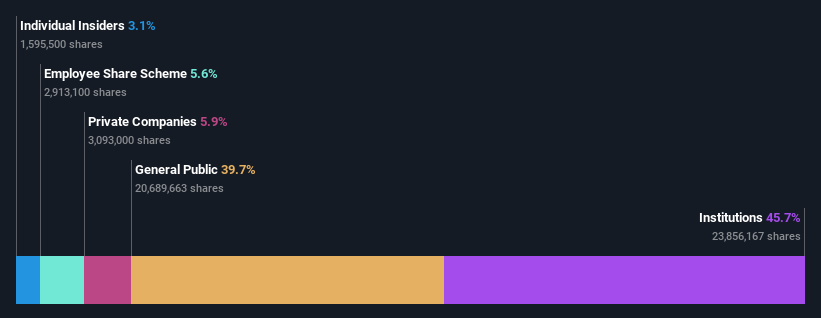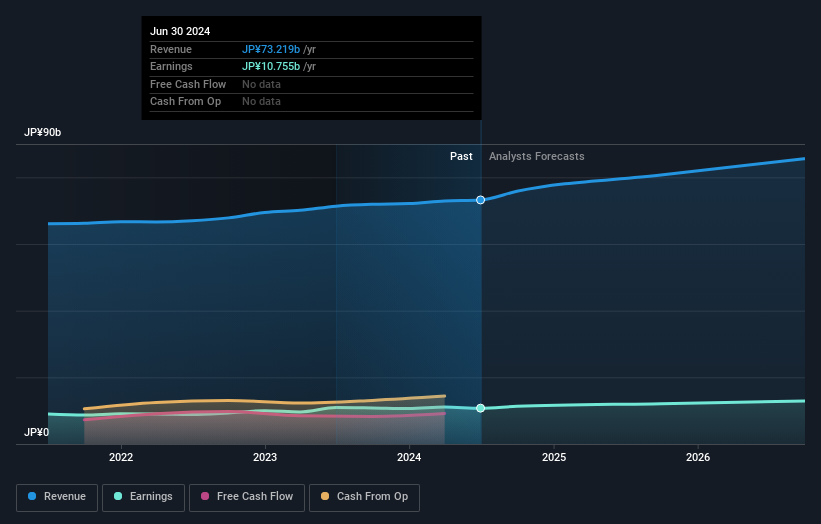- Japan
- /
- Professional Services
- /
- TSE:9746
Institutional investors are TKC Corporation's (TSE:9746) biggest bettors and were rewarded after last week's JP¥7.8b market cap gain

Key Insights
- Institutions' substantial holdings in TKC implies that they have significant influence over the company's share price
- 52% of the business is held by the top 11 shareholders
- Ownership research, combined with past performance data can help provide a good understanding of opportunities in a stock
If you want to know who really controls TKC Corporation (TSE:9746), then you'll have to look at the makeup of its share registry. The group holding the most number of shares in the company, around 46% to be precise, is institutions. In other words, the group stands to gain the most (or lose the most) from their investment into the company.
And last week, institutional investors ended up benefitting the most after the company hit JP¥209b in market cap. The gains from last week would have further boosted the one-year return to shareholders which currently stand at 17%.
Let's take a closer look to see what the different types of shareholders can tell us about TKC.
Check out our latest analysis for TKC

What Does The Institutional Ownership Tell Us About TKC?
Institutional investors commonly compare their own returns to the returns of a commonly followed index. So they generally do consider buying larger companies that are included in the relevant benchmark index.
TKC already has institutions on the share registry. Indeed, they own a respectable stake in the company. This can indicate that the company has a certain degree of credibility in the investment community. However, it is best to be wary of relying on the supposed validation that comes with institutional investors. They too, get it wrong sometimes. It is not uncommon to see a big share price drop if two large institutional investors try to sell out of a stock at the same time. So it is worth checking the past earnings trajectory of TKC, (below). Of course, keep in mind that there are other factors to consider, too.

Hedge funds don't have many shares in TKC. Our data shows that Iizuka Takeshi Scholarship Foundation, Endowment Arm is the largest shareholder with 14% of shares outstanding. For context, the second largest shareholder holds about 9.2% of the shares outstanding, followed by an ownership of 5.9% by the third-largest shareholder.
After doing some more digging, we found that the top 11 have the combined ownership of 52% in the company, suggesting that no single shareholder has significant control over the company.
While studying institutional ownership for a company can add value to your research, it is also a good practice to research analyst recommendations to get a deeper understand of a stock's expected performance. There is some analyst coverage of the stock, but it could still become more well known, with time.
Insider Ownership Of TKC
The definition of company insiders can be subjective and does vary between jurisdictions. Our data reflects individual insiders, capturing board members at the very least. The company management answer to the board and the latter should represent the interests of shareholders. Notably, sometimes top-level managers are on the board themselves.
Insider ownership is positive when it signals leadership are thinking like the true owners of the company. However, high insider ownership can also give immense power to a small group within the company. This can be negative in some circumstances.
We can report that insiders do own shares in TKC Corporation. The insiders have a meaningful stake worth JP¥6.4b. Most would see this as a real positive. If you would like to explore the question of insider alignment, you can click here to see if insiders have been buying or selling.
General Public Ownership
With a 40% ownership, the general public, mostly comprising of individual investors, have some degree of sway over TKC. This size of ownership, while considerable, may not be enough to change company policy if the decision is not in sync with other large shareholders.
Private Company Ownership
It seems that Private Companies own 5.9%, of the TKC stock. It's hard to draw any conclusions from this fact alone, so its worth looking into who owns those private companies. Sometimes insiders or other related parties have an interest in shares in a public company through a separate private company.
Next Steps:
It's always worth thinking about the different groups who own shares in a company. But to understand TKC better, we need to consider many other factors.
I always like to check for a history of revenue growth. You can too, by accessing this free chart of historic revenue and earnings in this detailed graph.
Ultimately the future is most important. You can access this free report on analyst forecasts for the company.
NB: Figures in this article are calculated using data from the last twelve months, which refer to the 12-month period ending on the last date of the month the financial statement is dated. This may not be consistent with full year annual report figures.
Valuation is complex, but we're here to simplify it.
Discover if TKC might be undervalued or overvalued with our detailed analysis, featuring fair value estimates, potential risks, dividends, insider trades, and its financial condition.
Access Free AnalysisHave feedback on this article? Concerned about the content? Get in touch with us directly. Alternatively, email editorial-team (at) simplywallst.com.
This article by Simply Wall St is general in nature. We provide commentary based on historical data and analyst forecasts only using an unbiased methodology and our articles are not intended to be financial advice. It does not constitute a recommendation to buy or sell any stock, and does not take account of your objectives, or your financial situation. We aim to bring you long-term focused analysis driven by fundamental data. Note that our analysis may not factor in the latest price-sensitive company announcements or qualitative material. Simply Wall St has no position in any stocks mentioned.
About TSE:9746
TKC
Operates as a specialized electronic data processing center for accounting firms and local governments in Japan.
Flawless balance sheet established dividend payer.


